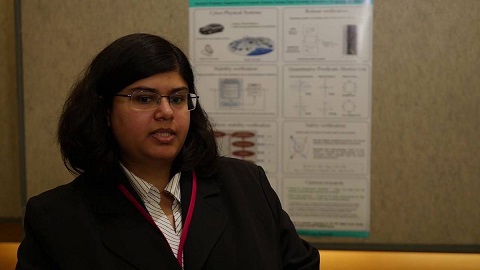Contribute
| ONR's Science And Technology Organization Announces 2017 Young Investigator Awards |
Press Release
06/01/2017
At least four Indian American researchers across the country were honored recently as recipients of the 2017 Young Investigator Award by the Office of Naval Research's Science and Technology Organization.
Among the 34 total recipients were Dr. Dhruv Batra, Dr. Pavithra Prabhakar, Dr. Padmini Rangamani and Dr. Kaushik Sengupta.
Batra, of the Georgia Institute of Technology, was recognized for "Explainable and Trustworthy Intelligent Systems" in the Machine Learning, Reasoning and Intelligence program.
Batra is an assistant professor at Georgia Tech's School of Interactive Computing. The Indian American is also a visiting researcher at Facebook AI Research and was a research assistant professor at the Bradley Department of Electrical and Computer Engineering at Virginia Tech. In addition to the Young Investigator Award, Batra has received an Amazon Academic Research Award for Visual Dialog.
Batra, who earned his master's and doctorate at Carnegie Mellon University, and his bachelor's at the Indian Institute of Technology Banaras Hindu University, has also held visiting positions at Microsoft Research, Carnegie Mellon University and MIT.
Prabhakar of Kansas State University was chosen for "Design of High-Assurance Cyber-Physical Systems" in the Science of Autonomy program.
Prabhakar is a Michelle Munson-Serban Simu Keystone Research Faculty Scholar and an associate professor with tenure in the computer science department at Kansas State University. Her research interests include cyber-physical systems, formal verification, automata theory and logic.
Prior to joining Kansas State in 2015, she served as an assistant professor at IMDEA Software Institute and was a postdoctoral researcher at the California Institute of Technology.
She earned her bachelor's from the National Institute of Technology Warangal, her master's from the Indian Institute of Science, and her doctorate from the University of Illinois at Urbana-Champaign.
Rangamani of U.C. San Diego was selected for "Non Equilibrium Thermodynamics of Biological Membranes" in the Undersea Medicine program.
Rangamani is an assistant professor in the mechanical and aerospace engineering department and a faculty-affiliate in the bioengineering department at U.C. San Diego's Jacobs School of Engineering. Her research is focused on understanding the design principles of biological systems.
Rangamani was a chancellor’s postdoctoral fellow in the Department of Molecular and Cell Biology and in the Department of Mechanical Engineering at U.C. Berkeley in 2013-14. The Indian American earned her Ph.D. in biological sciences in 2010 at the Icahn School of Medicine at Mount Sinai Medical Center in New York.
Sengupta of Princeton University was among the recipients for "Bit-to-THz: Universally Programmable THz Surfaces with Sub-wavelength Field and Response Synthesis" in the Expeditionary Maneuver Warfare and Combating Terrorism Department program.
Sengupta is an assistant professor of electrical engineering at Princeton. Among his research interests are Silicon-based RF, mm-Wave and THz circuits and systems, on-chip active electromagnetic field synthesis and self-healing and reconfigurable integrated circuits and systems in silicon, among others.
Sengupta, who earned a bachelor's from the Indian Institute of Technology, and a master's and doctorate from the California Institute of Technology, was an IBM Fellow, an IEEE Fellow and Caltech Institute Fellow, as well as an IIT Kharagpur Prime Minister Gold Medal recipient.
At least four Indian American researchers across the country were honored recently as recipients of the 2017 Young Investigator Award by the Office of Naval Research's Science and Technology Organization.
Among the 34 total recipients were Dr. Dhruv Batra, Dr. Pavithra Prabhakar, Dr. Padmini Rangamani and Dr. Kaushik Sengupta.
Batra, of the Georgia Institute of Technology, was recognized for "Explainable and Trustworthy Intelligent Systems" in the Machine Learning, Reasoning and Intelligence program.
Batra is an assistant professor at Georgia Tech's School of Interactive Computing. The Indian American is also a visiting researcher at Facebook AI Research and was a research assistant professor at the Bradley Department of Electrical and Computer Engineering at Virginia Tech. In addition to the Young Investigator Award, Batra has received an Amazon Academic Research Award for Visual Dialog.
Batra, who earned his master's and doctorate at Carnegie Mellon University, and his bachelor's at the Indian Institute of Technology Banaras Hindu University, has also held visiting positions at Microsoft Research, Carnegie Mellon University and MIT.
Prabhakar of Kansas State University was chosen for "Design of High-Assurance Cyber-Physical Systems" in the Science of Autonomy program.
Prabhakar is a Michelle Munson-Serban Simu Keystone Research Faculty Scholar and an associate professor with tenure in the computer science department at Kansas State University. Her research interests include cyber-physical systems, formal verification, automata theory and logic.
Prior to joining Kansas State in 2015, she served as an assistant professor at IMDEA Software Institute and was a postdoctoral researcher at the California Institute of Technology.
She earned her bachelor's from the National Institute of Technology Warangal, her master's from the Indian Institute of Science, and her doctorate from the University of Illinois at Urbana-Champaign.
Rangamani of U.C. San Diego was selected for "Non Equilibrium Thermodynamics of Biological Membranes" in the Undersea Medicine program.
Rangamani is an assistant professor in the mechanical and aerospace engineering department and a faculty-affiliate in the bioengineering department at U.C. San Diego's Jacobs School of Engineering. Her research is focused on understanding the design principles of biological systems.
Rangamani was a chancellor’s postdoctoral fellow in the Department of Molecular and Cell Biology and in the Department of Mechanical Engineering at U.C. Berkeley in 2013-14. The Indian American earned her Ph.D. in biological sciences in 2010 at the Icahn School of Medicine at Mount Sinai Medical Center in New York.
Sengupta of Princeton University was among the recipients for "Bit-to-THz: Universally Programmable THz Surfaces with Sub-wavelength Field and Response Synthesis" in the Expeditionary Maneuver Warfare and Combating Terrorism Department program.
Sengupta is an assistant professor of electrical engineering at Princeton. Among his research interests are Silicon-based RF, mm-Wave and THz circuits and systems, on-chip active electromagnetic field synthesis and self-healing and reconfigurable integrated circuits and systems in silicon, among others.
Sengupta, who earned a bachelor's from the Indian Institute of Technology, and a master's and doctorate from the California Institute of Technology, was an IBM Fellow, an IEEE Fellow and Caltech Institute Fellow, as well as an IIT Kharagpur Prime Minister Gold Medal recipient.
You may also access this article through our web-site http://www.lokvani.com/



